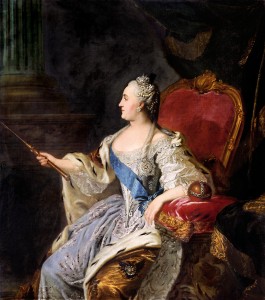
Portrait of Catherine II (1763)
In the article Catherine the Great and the Problem of Female Rule, Brenda Meehan-Waters argues that Western European writers and Russian writers view the reign of Catherine the Great differently, and that these views reveal cultural reactions towards women in positions of power. Western foreigner ambassadors and correspondents alike of Catherine II almost always bring into discussion the fact that she is a women and the traits that differentiate men and women. Foreigners describe her as having “a masculine force of mind” with a “weakness vulgarity attributed to her sex” and as “an ambitious and unnatural women” giving the impression that “there was something inherently perverse in female ambition”. ((KM 380 – 382)) In general, the authors states that Westerners who felt threatened by the idea of a women ruler responded either by denying that Catherine held any real power or they exaggerated her negative qualities, therefore making her sound less qualified.
Russians, on the other hand, rarely brought up the fact that she was a women. There are two exceptions to this that the author brings up. Karamzin contrasts the masculinity and femininity of Peter the Great and Catherine the Great and states that their reign complements the other but also attributes masculine traits as positive and negative traits as feminine. Sumarokov too has similar viewpoints articulates that there are strong and weak rulers and Catherine falls in between the two. ((KM 380-381)) In general though, Russians rarely focus on her femininity. The author points out that there was no ideological battle on female rule in Russia as there was in Western Europe, adding evidence that the sex of the ruler was less important to Russians. In fact, Russian empresses are often found in poetry as viewed as great warriors and strong figures. Another reason as to why the Russians view Catherine’s reign more positively is the old Byzantine idea of a hermaphroditic being that united the principles of both sexes. ((KM 384))
At the very end, Meehan-Waters points out that we more often study the reasons why Russians don’t judge her based on sex, and not why Europeans do judge her in this way and that this take on it is backwards.
Question:
Why do you think we assume that the Russian’s acceptance of a female is abnormal? How can this be explained by referring to leading Western thinkers?
https://upload.wikimedia.org/wikipedia/commons/0/06/Profile_portrait_of_Catherine_II_by_Fedor_Rokotov_(1763,_Tretyakov_gallery).jpg

I think the reason why western societies have a problem accepting a female ruler is how they generally view the position of a ruler. The article supports the idea that Russians respected the role of the Tsar and its power rather than who was necessarily fulfilling the role at the time. Western societies, on the contrary, placed more importance on the individual who would become the face of the nation. Perhaps having a woman representing the nation would make it look weak compared to having a male ruler in power.
I think Russian people saw her as the tsar, and as that is a title with has God associated with it, they respected her authority in that position. Divine right truly put the fear of God within the people, and they saw her as the one to fill the role first, rather than a woman. Also, the work she did and the reforms she enacted gave the people no reason to care whether she was a man or a woman. She was doing a fantastic job leading the people, and that is what they cared about. Outsiders were not as familiar with the system nor the work she had done, and so shrinking her down to only her sex was much easier.
I think it is an immediate response for us to assume that Russia’s acceptance of a female is abnormal. Historically, Western societies have always considered the male to be superior to women; it has become something engrained into the culture. As you mentioned in your post, Meehan-Waters suggests different possibilities as to why these different viewpoints exist, including the idea that “the sovereign emperor had become such an abstraction that it could be held by a German princess bereft of dynastic ties” ((Kaiser and Marker 385)) . Meehan-Waters enforces the thought that the concept of the emperor itself was such a far away concept for common people to grasp that it did not bother them that a female was ruling. I found it particularly interesting how she firmly concluded by promoting us all to “take [the Russian’s] silence” and instead focus “on the Western European emphasis on masculinity and the concomitant unease with a woman who is not subordinate to a man” ((Kaiser and Marker 385)) .
In our class on Monday, I was surprised by how (seemingly) empowered Russia’s female rulers were – they seemed to have had all of the same sovereign powers as their male counterparts, such as writing and signing laws, jailing enemies, and commanding the military. I wonder if one consequence of Russia’s contact with the West was the invitation of more deeply entrenched oppressions of women.